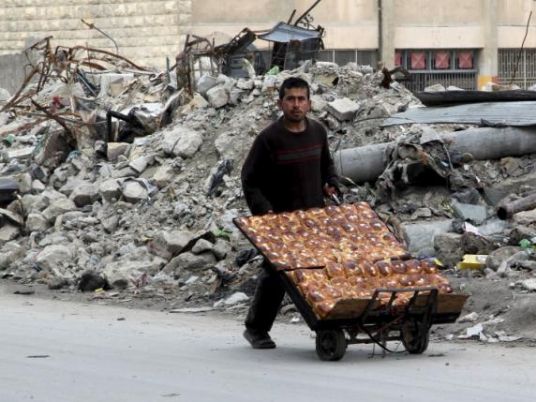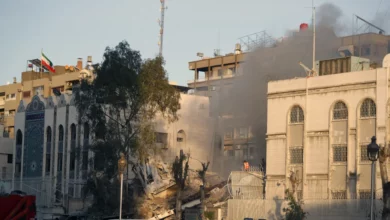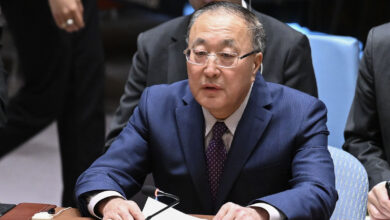
Major powers meeting in Germany on Thursday aim to revive Syria peace efforts, but with Russia backing a government push for a military victory, opposition delegates and Western officials see little hope of a diplomatic breakthrough.
United Nations Special Envoy Staffan de Mistura halted the first attempt to negotiate an end to Syria's war in two years after an unprecedented offensive by forces loyal to Syrian President Bashar al-Assad against Western-backed rebels supported by Russian air strikes.
In an attempt to prevent a collapse of diplomatic efforts to end Syria's five-year-old civil war, US Secretary of State John Kerry is pushing for a ceasefire and increased humanitarian aid access ahead of a meeting of the so-called International Syria Support Group (ISSG) in Munich this week.
But one UN diplomatic source said Russia was "stringing Kerry along" in order to provide diplomatic cover for Moscow's real goal – to help Assad win on the battlefield instead of compromising at the negotiating table.
"It's clear to everyone now that Russia really doesn't want a negotiated solution but for Assad to win," said the diplomatic source, speaking on condition of anonymity.
A senior adviser to Assad, Bouthaina Shaaban, told Reuters in Damascus on Tuesday that there would be no let-up in the army advance, which aimed to recapture the city of Aleppo from rebels and secure Syria's border with Turkey.
Target date
De Mistura set a target date of Feb. 25 to reconvene talks between the Syrian government and opposition in Geneva.
But in less than two weeks, the offensive by Syrian forces, Hezbollah and Shiite militias directed by Iran – all backed by Russian bombing raids – have reversed opposition gains on the ground and encircled rebels inside Aleppo, a strategic prize now divided between government and opposition control.
This has caused alarm among UN and Western officials, who believe the goal of the Russian-Syrian-Iranian campaign is to destroy the opposition's negotiating power in Geneva, kill them on the ground, and secure the first major military victory since Moscow began bombing opposition forces in Syria in September.
"It'll be easy to get a ceasefire soon because the opposition will all be dead," a Western diplomat told Reuters. "That's a very effective ceasefire."
The latest fighting around Aleppo has killed about 500 people on all sides, a monitoring group said.
Rebel groups say that while Washington put pressure on them to attend peace talks, there is less commitment to helping them on the battlefield. Appeals for anti-aircraft missiles to counter the latest offensive are falling on deaf ears.
Other Western officials said Kerry overestimated his influence and ability to bring the Russians around. They said he appeared to believe that since he achieved what some saw as unachievable by getting a nuclear deal with Iran he could do the same with Syria.
They noted that the two cases were different. With Iran, Russia wanted a political agreement whereas in Syria it is pushing for a military victory by the Syrian government.
"The Russians are playing cat and mouse with Kerry," said a senior European diplomat.
While it will not be difficult to get Russia to agree on an increase in aid deliveries, Western officials said, Moscow is clearly not committed to a comprehensive ceasefire that would halt what it seems as military momentum that favors the Syrian army and its Iranian-backed supporters.
False assumptions
"US policy was always based on a series of false assumptions. The main false assumption was that there is no military solution to the Syria crisis," said Christopher Harmer, an analyst with the Institute for the Study of War.
"The Assad regime has no interest in a political solution," he said. "The Russians have no interest in a political solution. Iran has no interest in a political solution. Hezbollah has no interest in a political solution."
Russia says its air strikes have been targeting Islamic State, a militant Islamist group that has seized large parts of Syria and Iraq, and not Western-backed opposition groups. But US and European officials say that is not the case.
Fewer than 30 percent of Russia's air strikes are targeting Islamic State, a group that a US-led coalition conducts bombing sorties against on a daily basis, Western officials say.
From the beginning, ISSG, which includes the United States and Russia, as well as key regional powers such as rivals Saudi Arabia and Iran and European nations, has been struggling to find common ground within its disparate ranks on ending the Syrian war.
After agreeing in November a road map for a ceasefire, UN-brokered talks between the government and opposition, and eventual elections, the ISSG has been unable to move ahead with peace talks. Some officials predict that the talks, like the opposition, could die a slow death in the coming months.
Bickering behind closed doors
A December meeting of the group was largely characterized by closed-door bickering about which groups in Syria should or should not be labeled a terrorist organization, which would bar them from the negotiating table.
Jordan had been assigned the task of drawing up the list and collected proposals from members of the group. Iranian Foreign Minister Mohammad Javad Zarif was infuriated when he saw that someone had proposed putting the Revolutionary Guard Corps' Quds Force, which is actively supporting Assad, on the list of terrorist groups.
"Zarif suggested that Iran might propose including the CIA as well," a Western diplomat said. After that, Kerry and Russian Foreign Minister Sergei Lavrov, who were chairing the meeting, briefly discussed the idea of having the CIA included.
Saudi Arabia, Turkey and Qatar have not hidden their view that there is little holding international negotiations when the Russian air strikes and Syrian government advance continue.
On the other side, Iran has made clear that it believes the Saudis – not Iran, Russia or Assad – are the major obstacle to peace. "There are some countries that it seems don't want peace to be restored in Syria," a senior official involved in the Syria talks said.
He also predicted there would be no breakthrough in Munich.
Meanwhile, Western-backed opposition figures have become increasingly exasperated by what they see as a failure of the Americans to put sufficient pressure on Russia to stop bombing them. They say it is it is impossible to negotiate when they are being bombed.
"One cannot expect the opposition to negotiate with a gun to their heads," French UN Ambassador Francois Delattre said in New York.
Advised by Western officials, notably France and Britain, and backed by Saudi Arabia and Turkey in particular, the disparate opposition groups representing political and armed factions in the talks are demanding concrete measures before returning to Geneva.
The Kremlin rejects claims that it has abandoned diplomacy in pursuit of a military solution, saying it would continue to providing military aid to Assad to fight "terrorist groups" and accusing Syria's opposition of walking away from the talks.
Diplomats said Kerry was taken aback by the sudden shift in the Russian position from apparently supporting efforts to replace Assad to throwing its military might behind him.
"You couldn't sabotage the process more than what the Russians have already done," said a senior Western official. "I don't see any hope today."




